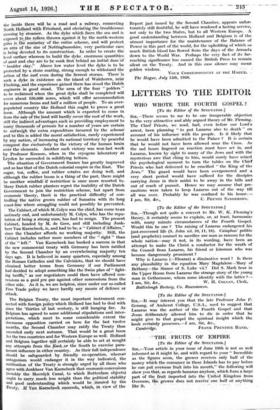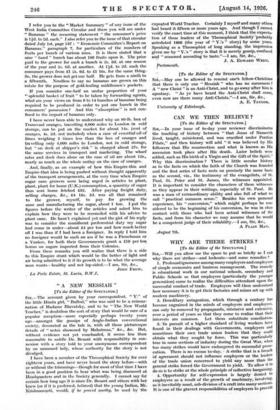'*:THE FRUITS OF EMPIRE
[To the Editor of the SPECTATOR.] SIR,—Your article, in your issue of June 19th is not so well informed as it might be, and with regard to your " Incredible as the figures seem, the grower receives only half of the money which the consumer in these Islands has to pay before he can put overseas fruit into his Mouth," the following will show you that, as regards bananas anyhow, which form a large part of the fruit imported into the United Kingdom from Overseas, the grower does not receive' one half or anything like it. T refer you to the " Market Summary " of any issue of the West India Committee Circular and there you will see under " Bananas " the recurring statement " the consumer's price is lid. to 2d. each." I also refer you to the issue of that circular dated July 1st, page 247: " Economic Committee's Report on Bananas." paragraph 7, for particulars of the numbers of fruits per bunch of various sizes. It is there stated that a nine " hand " bunch has about 180 fruits upon it. The price paid to the grower for such a bunch is 2s. 3d. at one season Of the year and 2s. 6d. at another. At 1 id. to 2d. each the consumer pays from £1 2s. 6d. to los. for the same thing.. So, the grower does not get one half. He gets from a ninth to a fifteenth. Needless to say no bananas are grown on this estate for the purpose of gold-leafing middlemen's pockets.
If you consider one-half an undue proportion of your
" splendid basket of fruit " to be taken by forwarding agents, what are your views on from 9 to 14 bunches of bananas being required to be produced in order to put one bunch in the consumers' possession? And this "absorption" is not con- fined to the import of bananas only.
I have never been able to understand why an 80-lb. box of Transvaal oranges, travelling 8,000 miles to London in cold storage, can be put on the market for about 14s. (cost of oranges, 4s. 2d. not included) when a case of essential oil of limes weighing 5 times less than the box of oranges and travelling only 4,000 miles to London, not in cold storage, but " on deck at shipper's risk " is charged about 27s. for the same services in transport and marketing. The wharf rates and dock dues alone on the case of oil are about 12s., nearly as much as the whole outlay on the case of oranges.
And, finally, as an example of how this Empire-this and Empire-that idea is being pushed without thought apparently of the transport arrangements, at the very time when Empire sugar cane growers were being urged in articles to plant, plant, plant for home (U.K.) consumption, a quantity of sugar thus sent home fetched £32. After paying freight duty, selling charges,. &c.,. £4 18s. 5d. was all that remained to the grower, myself, to pay for growing the cane and manufacturing the sugar, about 1 ton. I put the figures before the writer of the articles and asked him to explain how they were to be reconciled with his advice to plant cane. He hasn't explained yet and the gist of his reply was to consider the munificent preferential duty my sugar had come in under—about £4 per ton and how much better off I was than if I had been a foreigner. In reply I told him no foreigner would be such an ass if he was a Frenchman or a Yankee, for both their Governments grant a £10 per ton, bonus on sugars imported from their Colonies.
From these remarks you will realize that there is a side to this Empire stunt which would be the better of light and air being admitted to it if its growth is to be what the average man wants—healthy and not lop-sided.—I am, Sir, &c.,
La Perk Estate, St. Lucia, B.W.I. JOHN FREW.



































 Previous page
Previous page